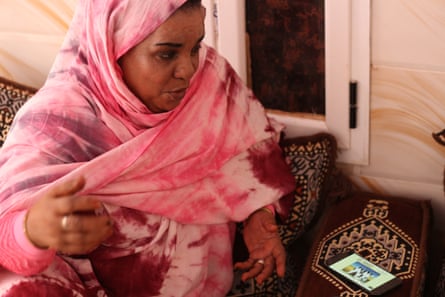L
Maulud Emhamed Sidi Bashir is currently residing in a tent that he put up in front of his home. He is using a small handheld radio, made of silver, to listen to music. In the refugee camps of Sahrawi near Tindouf, located in the southwestern region of Algeria, it is common for people to construct traditional tents in front of more modern buildings. The songs that Bashir, 75, is enjoying on his radio are a blend of traditional and contemporary styles, often performed by a group known as El Wali, according to his family members.
El Wali’s identity can be quite elusive to discern. There is limited information available on Google and only one album on YouTube, without any mention of the singers or musicians involved. The band’s origins in the Western Sahara are also relatively unknown to many. However, El Wali has emerged as a quasi-national orchestra, with songs that lack clear credits and ownership, and a fluid composition of members that evolves over generations.
While traveling through the Hamada desert, Lud Mahmud, a member of the independence group Polisario Front, attempts to clarify. He gestures towards the scattered camp set up on the flat, rocky terrain. “This is El Wali,” he says. A short distance away, at the next camp, he repeats, “This is El Wali.” The idea is evident: for Polisario music, everything is El Wali. Some members may stay in the band longer than others, but there have been numerous individuals who have been provided for by each camp.
Located between Morocco and Mauritania, this desert was a former Spanish province and one of the final European colonies in Africa. In 1975, Spain relinquished control to Morocco. The indigenous people of the Western Sahara, known as Sahrawis, were primarily nomadic tribes with little sense of nationhood before being displaced by Morocco. In the late 1970s, they sought shelter in the south-western region of Algeria and, united by their shared adversary, established the Sahrawi Arab Democratic Republic (SADR).
The Polisario Front, a left-wing group, initiated a guerrilla war against Morocco that is still ongoing. The fighting has grown more intense in recent times, particularly after former US President Donald Trump acknowledged Morocco’s assertion of control over the region in 2020. Despite being largely overlooked by the global community, this conflict stands as one of the longest-running wars in Africa and a persistent struggle against colonization (according to the UN, Western Sahara is classified as a non-self-governing territory, essentially functioning as a colony of Morocco).
Bashir and Mahmud were part of the large group of individuals forced to vacate their homes in Western Sahara and seek refuge in camps located in Algeria. In these camps, the Polisario utilized music as a means to instill a sense of national identity. They transformed traditional poetry, incorporating lyrics depicting the fight against Morocco, into musical pieces. The outcome was a striking fusion of western and indigenous instruments, performed by a band that would eventually be known as El Wali.
Ahdaidhum Abaid Lagtab, a former member of the band El Wali, shares that she joined the band during the time of conflict and remembers the loss of Sahrawi lives. At 16 years old, Lagtab, along with Bashir, fled from the Moroccan army. She clarifies that while their music did not focus on political themes, they spoke about societal issues and the desire for freedom.
In 1979, she became a member of El Wali, an already established band with approximately twelve members. They were named after El-Ouali Mustapha Sayed, a co-founder and well-known martyr of the Polisario Front. With a rock star appearance and the charm of Che Guevara, he inspired the emerging nation before passing away in 1976 at the age of 28 during a raid. He remains a beloved hero among the Sahrawi people.
We are accustomed to thinking of bands as being confined to a particular time and place, with contracts and copyrights, breakups and reunions. However, for El Wali, this is not the case. Shueta, a veteran singer and drummer who joined the band at its inception, explains that in the beginning, it was a national endeavor organized by the nation. Each district would select an artist to join the band, with some playing traditional instruments like drums and others playing modern ones such as the guitar and keyboard. These two styles balanced each other. Shueta recalls her time with the band in the 1980s and early 1990s, where they toured and performed in countries like Libya, South Africa, Portugal, East Germany, and even North Korea, from the comfort of her living room filled with carpets and cushions.
In 1994, El Wali traveled to Belgium to participate in a recording session organized by Oxfam. Hilt Teuwen, the production manager, recalls the band Shueta who was also present. Teuwen had previously met them at the camps and invited them to Belgium, resulting in a high-quality recording. The album, Tiris, features 13 songs with three vocalists and a variety of instruments including electric guitar, bass, drums, keyboard, and tidinit, a traditional Sahrawi lute. The album blends cheerful and nostalgic melodies that portray the origins of the war against Morocco and the story of an exiled people yearning for independence. Although the band lineup has changed over time, El Wali still continues to exist.
The world – or at least the west – would have probably lost track of Tiris if it wasn’t for a self-described “guerrilla ethnomusicologist” and producer from Oregon named Christopher Kirkley. Around 2009, Kirkley was touring the Sahel (a stretch of the southern Sahara) and west Africa to collect samples of local music for an album series called Music from Saharan Cellphones.

During that era, the individual explains, the internet had not yet reached widespread usage in the area. However, mobile phones and Bluetooth technology were prevalent, and people utilized them to share and enjoy music. The primary method of obtaining songs was through copying them from one phone to another, effectively creating a network. Throughout his investigation, Kirkley repeatedly encountered songs from El Wali on memory cards and SIM cards, but he was not familiar with the performers at that moment. Due to limited information, the songs were often simply titled “Polisario.”
Kirkley noted that Sahrawi music played a significant role in introducing the use of electric guitar in the region, especially in West Africa during the 1990s. The popular Tuareg guitar music, also referred to as desert blues or Tuareg rock, performed by prominent artists such as Mdou Moctar and Grammy-nominated Tinariwen, was heavily influenced by Sahrawi guitar music. According to Kirkley, the upbeat and reggae-influenced rhythms, which are synonymous with Western Sahara, have their roots in Sahrawi music.
Following the successful release of Music from Saharan Cellphones Volume Two in 2012, the artist embarked on a journey spanning eight years to uncover the origins of these popular Sahrawi songs, often heard on the region’s mobile phones. With the help of individuals working in NGOs in Western Sahara, the artist connected with Sahrawi music producer Hamdi Salama, who then introduced him to Ali Mohammed, the guitarist on El Wali’s Tiris, who recounted the recording session in Belgium with Oxfam. By chance, the studio engineer Pierre Jonckheer had a CD copy of Tiris, which he had recorded.
Kirkley explains that this CD has seemingly vanished from the internet and all western media, with no mentions or information to be found. However, he finds it intriguing that the music still exists and is being shared through a network of phones. Without this technology, the CD may have never had a “second life.”
In 2019, Kirkley and Salama reissued Tiris by El Wali, which can now be found on Spotify and YouTube, where this story originally began. Currently, they are collaborating on a new album featuring music by the Sahrawi band. Kirkley states, “This upcoming release was created by a completely different group of people. It can be confusing to present it to an audience and say, ‘Yes, this too is from El Wali.'”
Back in the desert, a large national parade is being held to mark the 50th anniversary of the Sahrawis’ struggle against occupation. The day is dominated by the military with armed vehicles carrying outdated rockets past onlookers who gather on top of cars under the punishing sun. The night, though, belongs to music. Shueta takes the stage, as she has many times before, to sing from exile. Much of the crowd is too young to ever have seen the homeland her lyrics speak of, but each strum of electric guitar carries with it the shimmering promise of a Sahrawi state and the unbroken music of El Wali.
Source: theguardian.com


